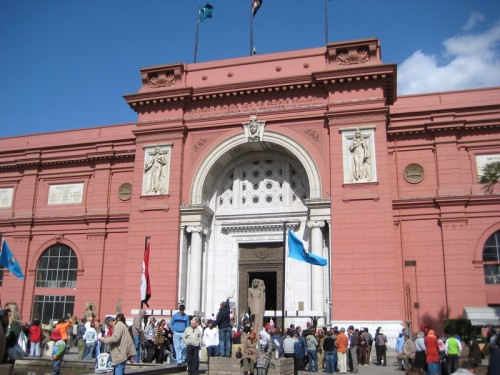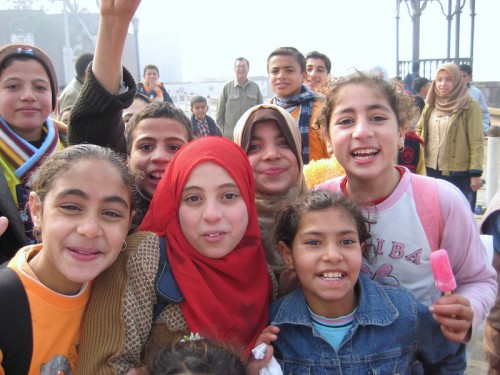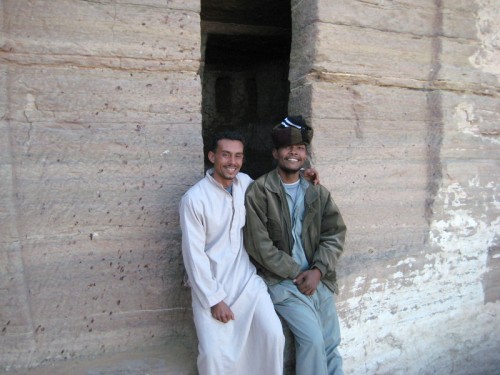“The stuff on the news is nothing, Egypt the way we know it is over…it is a full scale revolution and the people will wake up to a different country tomorrow…if they ever go to sleep.”
I read this statement on Facebook a few days ago, on the second day of protests in Cairo and elsewhere in Egypt. It was a status update from Shady, the tour manager who guided me and 13 others around the country for two weeks in 2008 (this quote and the others below are reprinted with his permission). Exactly three years ago today, I was discovering the pyramids in Giza, exploring the Egyptian Museum and overall falling in love with an amazing country. Now, the present of this country is in turmoil and its future unclear.
Even though he is not in Egypt right now, Shady’s updates have continued, based on information he is getting from friends and family:
“Protesters are forming human shield in front of national museum to protect from looting!”
And just a few hours later:
Museum has been looted!!!! I just saw Ka-aper smashed on the floor…I think I’m gonna die.
This last update brought tears to my eyes. The idea that artifacts, dating back thousands of years, could so carelessly be destroyed by vandals simply broke my heart. One of the reasons I visited Egypt in the first place was its history. I read with curiosity about the legends of Cleopatra, the discovery of the tomb of the boy king Tutankhamun and the mysteries surrounding Akhenaten and Tell el Amarna. I was fascinated by the building of the pyramids and the enormous temple structures in Luxor, Karnak and Abu Simbel. In my mind, the crown jewel of Egypt was its vast history.
“All over Cairo, civil vigilantes together with the military have grouped together in the streets to protect their neighborhoods. The vigilantes are marking themselves with white armbands and are armed with sticks, knives and crossbars.”
One of the things that initially struck me when I visited Egypt was the presence of a metal detector at the entrance of my hotel and the tourist police looming nearly everywhere. While driving to Middle Egypt on a day trip, we were supposed to be accompanied by an armed guard – my guide told me it was because I was an American (he lied and told the guards I was Spanish to get out of it, not sure how he got away with that!). According to him, given the amount of aid Egypt receives from the United States, they are especially sensitive to the possibility of American tourists being harmed – they don’t want to risk losing that valuable aid. Similarly, when my tour group took a bus from Aswan to Abu Simbel, we were part of a convoy led by the police. And as we drove around the Sinai Peninsula, we passed through numerous security checkpoints where everyone’s passports were checked. Security definitely seemed to be a top priority.
“The regime has emptied the prisons all over Egypt. Prisoners are let loose in the thousands. There is no police and the civilians are defending themselves in the streets.”
While the constant police presence might seem nerve-wreaking, it was actually reassuring and I felt quite safe during my entire trip. Sure, there was the occasional hassling by vendors in the markets and touts around the major tourist sites, but I never felt physically threatened. On the contrary, my most vivid memories were my interactions with the Egyptian people: The children who surrounded me to have their picture taken outside of a mosque. Mohammad and his friend who showed me around the Tombs of the Nobles in Aswan, acting out stories to explain what I was seeing because they spoke almost no English. The shopkeeper in Aswan who dressed me up in a tunic and Nubian headdress, posed for pictures with me and then laughingly asked my companions, “how many camels for your friend?” The vendor in Khan el Khalili who ran from stall to stall trying to find enough small bills to change my 100 pound bill. My guide Adel, who nearly got himself arrested at Beni Hassan trying to make sure I could take a few pictures and then squeezed in Tuna al-Gebel to my itinerary at no extra cost because he thought it was important for me to see. The touts throughout the markets who, given the unseasonably cold weather in late January, greeted me with calls of “welcome to Alaska!”
“The regime is now using scare tactics on the protestors in Liberation square, as it is ordering F-16 fighter jets to fly, low over the demonstrations. The roar from the engines is met by a roar of defiance by the people every time the jets fly over the square. It is clear now that they are not backing down and are not intimidated. But also, from talking to the people in the square, I can tell that they are embracing for a storm to come.”
I don’t profess to fully understand the situation in Egypt, although the widespread poverty and a low standard of living were evident when I visited. I saw filthy conditions that just made me wonder, how do people live like this? Why don’t they do something about it? I think this quote from an anonymous Egyptian blogger sums it up:
“I protest because in Egypt we lack dignity and a sense of humanity. I protest because I cannot take part in any elections and they’re all rigged. I have no voice, I have no vote. I protest because poverty around me impoverishes me even though I possess money. I protest because everyone around me is unhappy and we’re capable of so much more, much more. ”
I have heard some compare this current revolution to the events that took place in Eastern Europe 20 years ago as the Berlin Wall came down and the Soviet Union crumbled. We can only hope that the events of the last week will someday be looked back upon as the impetus for lasting political and economic change for the better. As much as it pains me to read about buildings on fire, thugs on the loose and people getting shot, I try to keep things in perspective that one day, it will all be worth it for the Egyptian people.
And looking ahead, I hope that when the current violence is over, people don’t write off Egypt as a travel destination. The tourism industry accounts for a significant portion of the country’s GDP and, frankly, the Egyptian people need us. Local hotel owners and staff, tour guides, market vendors, felucca operators, carriage drivers and, of course, the often-annoying touts outside pyramids and other major tourist sites – they all depend on people like us just to stay afloat and feed their families. No matter what happens in the days and weeks to come, Egypt will suffer if people like you and me stay away.





